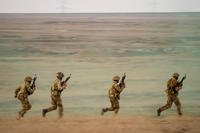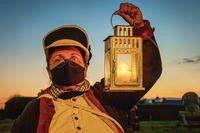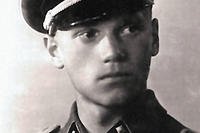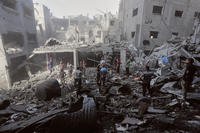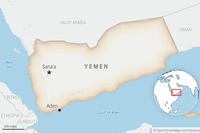We just finished "chowing down" and decided to take a shower. We are in a forward secure camp outside Kon Tum City. Actually, it is only as secure as we make it because we are the perimeter guards while here. We stop by a hut and pick up fresh clothes. You have your choice of sizes in large, extra large and super extra large.
Heading for the shower, we must have looked a little odd. I'm naked with a .45 on my hip, and everyone else is dressed the same and has an M-16 over their shoulder. Arriving at the shower, we find out the water tank is empty. There is a stream just inside the barbed wire in front of our bunker so we head for the stream.
We approach the stream with caution, expecting trip flares and maybe some booby traps. There are none and we worry about that, because the high banks would make excellent fighting positions if the NVA [North Vietnamese Army] decided to overrun the compound. The water is fairly clear, and there aren't too many leeches so we bath there.
We dry off and put on the clean clothes and head back to the bunker. At the bunker, we shave, and everyone is complaining about being "all dressed up and no place to go." We open up a few beverages and sit in front of the bunker and talk. I have about 33 days left in my tour of duty, and they are ragging me about going home. About half the squad is now FNG's (expression used to designate new unseasoned troops) that came aboard in the last four months while we have been running convoys, doing mine sweeps and securing the highway. These were our monsoon jobs because it is too dense to head into the bush with armored personnel carriers (APC), because they don't perform well in mud.
The conversation gets around to "back home in the States" and the prime objective. My prime objective has always been to get back to my career, but everyone else's top three priorities are:
1. Women
2. Women
3. Women
I think I must be losing my mind, because their arguments start to make sense and I put my career as fourth on my list. We also spend a lot of time contemplating the insanity of the war. We are of the belief that we could win if the politicians would take a powder and let us fight
It is getting dark now, and everyone drifts back to their own bunker. I pull first guard as usual. It will only last about an hour. I actually like guard duty. It is time to yourself and your own thoughts. It was a time to put the mind back in order. For me, it was also a time for prayer.
My faith has grown stronger while in Nam. I think this is because of the simplicity of the situation. You either live or die. Life is very uncluttered and pretty straightforward. I never prayed that my life be spared because I believe that God will not allow our life to end even one second before the time that has been appointed, and we will not delay it even one second if that time is reached. I did pray for wisdom. I prayed that my decisions and actions not needlessly cause death or injury among my men, because I didn't do the right thing or handled a situation badly.
Tonight my prayers are troubled. I am overcome with a sense of dread like I have never experienced. We change guard and I retire to the bunker, but I can't sleep. The dread keeps pulling at my mind and soul. I become afraid. I cry out in my mind, "Lord, what's the matter?" A thought appears in my mind and says, "Tomorrow." "Lord, what will happen tomorrow?" I replied. "Tomorrow, you will change." appeared in my mind. "Will I die?" I asked. "No," came the reply. Instantly the feeling of dread left me. I felt peaceful and knew whatever happened tomorrow would be watched closely by the Lord, and I had nothing to fear. I slept peacefully.
I am woken by the last guard and begin preparing the APC. I suspect we will guard a convoy between Kon Tum and Pleiku. I check my oil levels and hydraulic fluid. I time the .50 caliber machine gun and oil the ammo a little. I keep thinking about the night before.
The lieutenant calls a meeting and we find out we are going back into the bush on a company size patrol. I look at the coordinates on the map that we will cover and warning lights start flashing in my brain. We had been in that area 6 months ago and surely by now the NVA had moved back in. We returned to our squads and pass the information along.
At 8:00 AM we all mount up. Another APC pulls up beside me and I look at George Blackwell, the squad leader. George has been in country as long as I have and used to be a member of my squad. He took over another squad when their squad leader DROS'ed (date returned from overseas). George and I have been brothers in the true sense of the word. We make eye contact, and I can see the dread in George's eyes. Silent words flash between us. It is somewhat frightening; we both know today is different.
I leave my APC and climb up on George’s APC and say, "George, you got the same feeling I have." George looks at me for a long time and says, "Yep." We both look at each other wanting to speak, but the words won't come. Finally I hold out my hand, and we do a dap (a form of handshake). "Keep your s--- together," I say. "You, too, Brother," he replies.
I return to my APC and stand in the driver's seat and look over the squad. I want to tell them, "Look, guys, this is my last patrol, and I want you to know I was proud to serve with all of you. You are my brothers, and I love each of you." But my lips won't move, and the words won't form. I am also beginning to wonder if I am getting a little "dinky-dou" (crazy).
The radio comes alive. Second platoon will lead, and Two-two (me) will be on point. I call the lieutenant and tell him to put someone else on point. I am leaving in 30 days, and someone else has to learn how it's done. (This wasn’t an unreasonable request, because someone did have to learn the ins and outs of driving the point track. Bottom line though was, I chickened out. )
We drive down Highway 1 and turn onto a dirt road by "Tin City," a Yard village with tin roofs, and head into the bush. We stay on the dirt road about 8 clicks and then head off into the boonies. Traveling is slow because the new point man keeps screwing up. To break brush and blaze a new trail is a bit of an art. You have to know that certain trees can be pushed over like matchsticks while others will stop you dead.
You must avoid ground that may cause you to throw a track off the sprocket if you turn quickly. You must watch for Army ants because if you hit a tree with them on the march, it literally rains biting ants on top of you. You must do all this and watch for enemy and booby traps.
We come to a halt because the point track hit a tree and the jolt threw the men off the APC. One guy has a broken arm. An APC is sent back to base camp with the injury on board. I am overcome with the feeling of guilt. My mind is nagging me that I should be on point. I offer a very short prayer: "If that's where you want me, Lord, then I'll go." I call the lieutenant and tell him I am taking over point.
I break brush and blaze a new trail for about three hours. We are deep into no man's land. All of a sudden, a warning light starts flashing in my mind. Ahh, now I see it, but I decide to continue to determine if my new instant NCO can pick it up. I continue on. Another 10 meters, and I can delay it no longer. I pull back on the laterals and stop the track. Six inches from my head is a tripwire.
I stand up in the driver's seat, and the "Instant" asked me why I stopped. I calmly point at the tripwire running between the trees. One end of it is fastened to a grenade inside a tin can. I cut the wire and disable the grenade. Then I verbally ream him out for not being observant enough.
I know the time is approaching fast, and it is going to be one hell of a party. The booby trap was designed to kill personnel riding on an APC, because the trip wire was 6 foot off the ground. The track should catch the wire and the grenade should be pulled onto the APC. Two gallons of adrenaline flows into my body, because this tells me that whoever is in this area is expecting armor and is probably prepared to handle it.
I get on the radio and switch to the Company network. I call the CO.
Niner-one (the CO) this is Two-two-Delta (me)
Go ahead Two-two
Niner-one, I don't know if you believe in an old soldier's sixth sense, but mine is telling me that things are about to get rough. I believe the beginning of it will be directed at me and you may have to come up here and get me out of it. Now, I know we got a lot of green troops with us and I would like you to be sure everyone has a round in the chamber and the safety on rock-and-roll (automatic)
This is Niner-one, You Papa-Limas (platoon leaders) heard the man!
(all of a sudden the jungle is filled with the sound of rounds being chambered. That told me that no one was really prepared for enemy contact.)
Niner-one, I also suggest the Papa-Limas meet with their Sierra-Limas (squad leaders) and get their act together.
This is Niner-one, We will break here for 15 minutes.
Thank you, Niner-one. Two-Two-Delta out.
I get off the track and go back with the other squad leaders dragging my "Instant" with me. I talk to George again, who is looking real worried. I tell him if I survive the initial rockets, I will immediately assault the position. I want him to come up and cover my open flank while the remainder of the tracks alternate pulling right and left. If I don't survive the initial attack, George will do the assault.
We get back to the squad and I can see the change. I see fear in the eyes of the new guys and worry in the eyes of the seasoned troops. Everyone looks at me. Thousand of things to say flash through my mind. I want to tell them how much they mean to me. I want to tell them that I am as afraid as they are. I want to tell them that I don't want to die. I want to say goodbye, but I know if I do, it might shake them up even more. Instead I say. "When it hits, we are going after it. At the first sound of a weapon being fired, I want everyone to open up. Keep your shit together and we will be OK."
We move out.
Another hour passes. We come to a big gully that we will have to cross. Again the adrenaline starts to flow. Staying alive in Nam means learning to think like the enemy. I don't like this gully one bit. If I am at the bottom and get ambushed, I can't maneuver much. If I get hit on the other side, it will take extra time for the other tracks to get to us and join the party.
I cross the gully, followed by Two-one and Two-three APC. Then the party starts. An anti-tank rocket is fired at me, and small arms fire breaks out. The rocket enters the track below my driver's seat. We have our act together and are returning fire immediately as I turn into the enemy. It is raining lead, and I pause so the other tracks can get into position for an assault. I see an NVA stand up and a muzzle flash. Instinctively I throw my right arm across my eyes. The rocket explodes beside my head. The area around my head is fire and molten metal.
My earphones disintegrated, as do my glasses. My left cheek is ripped from my face and my forearm torn to shreds. Hundreds of minute pieces of shrapnel enter my skull. My shoulder is blown open. The concussion paralyzes the left side of my face and destroys most of my hearing. A guy sitting on top of the track had his foot near my head and no longer has a heel.
I lower my arm and look at it. I say, "I've been hit." I feel no pain and am totally unaware of the extent of my injuries. I am quite upset. I start the assault. As I look around, everything is getting red. Then blackness sets in.
(the following was told to me by squad members who I met in the hospital later)
I slumped over in the driver's seat. My assistant driver pulled me back and hopped in on my lap and finished the assaults. The enemy was defeated and dust-offs (medical helicopters) were called in. They pulled me from the hatch, and the medic went to work. He started hooking plasma up to me, because I had lost a lot of blood.
My men took my personal effects to send to me later. They watch. Some fight the tears. One of them says, "Say, Doc, remember that's Barry so you better hook a beer up to him along with that plasma." The Dust-offs arrive and take us away.
I arrive at the hospital. They wire my jaws shut because it's broken. Suture my shoulder and wrap up my arm. They repair major veins in my neck and get my blood supply back up to par. The heat of the blast had cauterized my cheek and forearm so the wounds were bound. I am alive, but they can't determine if my brain was getting enough blood or not. I am now stable but whether I live or die is something only time will tell.
October 17th 1969
My eyes opened. My brain started to function. I looked around. I tried to move my right arm but it wouldn't budge. My left one moved OK. I reach over with my left hand and took inventory of my private parts. Everything was still there and not bandaged. I think, "Can't be all that bad if I still got them." I move my feet. No pain.
I notice someone sitting on my bed. The being is dressed in white and has flowing golden hair. I think, "That's one damn weird-looking nurse." I study this being and am confused. It could either be a handsome male or a pretty female. We start to talk. I know we conversed for quite a while but have never been able (or maybe not permitted) to remember the conversation.
I do remember feeling a great peace. I also knew the worst was over, and everything was going to be OK. I do remember being asked a question. He asked if I wanted to go with him or go back. I knew by this time that the conversation was taking place on a different plane. I was in the hospital, and yet part of me was not. For the last 6 generations, my family name has been passed on through one male per generation. I said I wanted to go back but I would probably need help. I didn't want the family to end in some Nam hospital. I was told I could go back. If I needed help, it would be given.
My eyes open and confusion really set in. I thought I already had my eyes open a second ago. The room looks exactly the same. The only thing missing is the being that was setting on my bed. Don, my buddy, is at the foot of the bed yelling for a nurse. I think about the being and make the deduction that it was just a dream. Then I feel movement on my bed. I feel someone, someone I can no longer see, stir and stand up. I no longer believe it was just a dream.
I look at Don and see him crying. I cry also, in joy, for I am alive.
I spent another year and a half in the hospital. The help that was promised came often and I can honestly say I never suffered. I had a peace within me that was greater than I was. I came to a new realization of how personal God was. I know he is supposed to number the very hairs on our head, but prior to this, I doubted that I could be that important to God.
I found out otherwise. He cares, and he cares deeply for each of us as individuals. I have wondered why an angel was sent to minister to me and I believe strongly it was an answer to prayer. I found out later that at the exact time the angel appeared, my congregation at home was praying for me. In the years that followed, that memory gave me much assurance through some rough times in my life.
We were guarding the large pontoon bridge that crosses the river north of Kon Tum. It was nice duty because we had the river for swimming and bathing. Being close to the city, we also managed to buy some ice in quantity and were actually drinking cold beer and sodas. Due to the bridge's importance, we were spared daily missions because the bridge had to remain guarded 24 hours a day.
One morning, 22 squad was ordered to MEDCAP a village. This wasn't uncommon except when given the location the Montagnard village would be back toward Kon Tum. We had just come from there, and nobody could remember passing anything like a village. We asked for the coordinates again and got the same location. We mounted the APC and took off in search of the "phantom” village.
The road was lined with a lot of houses, and when the Vietnamese kids heard the APC coming, they would run alongside the road and we would throw them assorted candy. They accepted the candy with great joy. However, if they happened to catch a chocolate bar, they would try to throw it back. Nobody seemed to like chocolate that refused to melt without the aid of a blowtorch.
We got to the coordinates and had to drive up and down the road until someone finally spotted an entrance to a fenced-in village that was well off the highway. I drove to the entrance. Something seemed very out of place. The village had a tall bamboo fence around it. There was a rather large archway in front with a sign above it that none of us could read. There was a cinder block building that appeared empty to the left of the archway.
I shut down the APC and told Doc Ritchie not to enter the village until I checked out the cinder block building. Three of us cautiously checked out the building and found it to be totally empty. This whole setup made me very uneasy. The building was not of the typical construction for the area. It had a cement floor, looked relatively new and had a watertight roof. Why was it abandoned? Given the state of the shacks, the Vietnamese were living in less than 100 yards away; why hadn’t they simply moved in the building?
We went back to the APC, and I studied the village. This village made no sense. I had never seen a Montagnard village this close to a Vietnamese populated area. Also, I had never seen a village with a 10-foot bamboo fence around it. Another strange fact was, nobody came out to greet us. The Montagnard were the most hospitable and friendly people I met in Vietnam. I had never arrived at one of their villages without a whole flock of people immediately coming out to greet us.
I thought to myself, "A phantom village full of phantom people.” MEDCAP’s were normally great fun. Treat the people, pass out candy to the kids, have a little rice wine with the village chief, ogle at the bare-breasted women and enjoy doing something good for a change. But this MEDCAP had all the vibes of an ambush. We decided Doc and I would enter the village, and three riflemen would follow us about five paces behind us. The rest of the squad would remain on the APC ready to crash through the gate in case things went bad.
Doc and I entered the gate and started walking toward a hut. The riflemen entered behind us and began to fan out. My eyes were going back and forth, looking for an ambush, and when we got about 15 meters from the hut, someone behind me said "Jesus, lepers!” I looked behind me and saw the riflemen hightailing it for the gate.
Doc and I froze. We saw heads begin to peep out of the doorway of the hut, and from their condition, it was obvious that we were in a leper village. I looked at Doc and asked him if we should stay or de-de-mow. Doc told me that there was nothing to fear, because leprosy wasn’t highly contagious, and although he could not treat leprosy, he would like to offer treatment for anything else they might need.
We took a couple steps, and the people ducked back inside the hut. We stopped and Doc, who had lived in a Montagnard village for a couple months before joining us, tried to talk to them. My mind kept going back to the strange building outside the gate and finally a light went off in my head. I figured at one time, missionaries probably occupied it. As Doc kept talking, I pulled the cross from my shirt and held it up so they could see it. Slowly they started to come out of the hut.
I was not startled by their deformities, but I was highly distressed by their eyes. Their eyes were full of fear. No matter what Doc said, they would not allow us to get close to them because they were afraid of us. My mind was racing and I could only come up with one thought about lepers and that was Jesus healed them. And I marveled at what a truly miraculous healing it must have been. Disease eradicated, body parts restored, and a terrible fear put to rest.
Doc kept talking to them but was getting no response. I told Doc to keep talking and I went back to the APC. I picked up two cases of C-rations and went back into the village. I put the rations on the ground and opened the case. I extracted the P38 (a can opener) and proceeded to show them how to use it. Doc tried to tell them that the food was theirs, but they still would not approach us so Doc and I slowly started to back up. As we backed up, they came forward. They picked up the C-rations, and some of the faces showed a wisp of a smile as they went back in the hut. Doc and I turned around and went back to the APC.
I cranked up the APC and took a last look at the phantom village. I prayed, "Lord please let there be enough fingers there to operate a P38."
Want to Know More About the Military?
Be sure to get the latest news about the U.S. military, as well as critical info about how to join and all the benefits of service. Subscribe to Military.com and receive customized updates delivered straight to your inbox.

